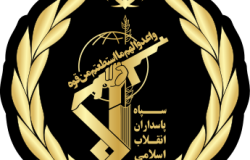Iran’s Islamic Revolutionary Guard Corps: Why an EU Terror Listing is Legally Possible

Lukas Märtin argues that an EU terror listing of Iran’s Islamic Revolutionary Guard Corps (IRGC) would be legally possible. The public debate within the EU of whether to take this step should focus on political considerations instead of relying excessively—and often inaccurately—on the EU legal norms governing the EU terror list.
The arrest of Jina Mahsa Amini by the Islamic Republic’s so-called morality police, which led to her death on 16 September 2022, ignited major protests across Iran. In response to this revolutionary movement, a controversial debate has arisen within the European Union (EU) as to whether the Council of the EU should place the Islamic Revolutionary Guard Corps (IRGC) on the EU terror list. Although the German government, for instance, has affirmed that it supports this listing politically, it has long refused to take this step, citing legal constraints that allegedly prevent the listing of the group. Recently, however, it has been revealed on 27 May 2024 that the Federal Republic supports listing the IRGC within the Council of the EU, which is competent to place an entity on the EU terror list. This shift in stance follows a judgement by the Düsseldorf Higher Regional Court, which found it proven that Iranian state agencies were behind an attempted arson attack on a synagogue in western Germany.
Recourse to the law is a structural feature of many political debates. Within states governed by the rule of law, this is not too surprising. Nonetheless, in public debates the law is prone to being portrayed in a simplistic manner in order to use it as a political argument. A prime example is the statement made by the High Representative of the Union for Foreign Affairs and Security Policy Josep Borrell when asked at the margins of a foreign ministers’ council in Brussels on 23 January 2023 as to why the EU did not include the IRGC on the EU terror list. He responded that a group cannot be listed just because one does “not like” it. Instead, he insisted, a judgement by a Member State court was necessary for a group to be included on the EU terror list. The political calculus of such a statement is obvious: If the legal background is presented as unambiguous, a political decision can be avoided, which in turn relieves the acting politicians of their political responsibility. However, generic references to the law are often incorrect. This is also the case with the statement of the High Representative Borrel mentioned above.
According to Art. 1(4) of the Council’s Common Position 2001/931, dated 27 December 2001, which forms the legal basis of the EU terror list, a decision by a national authority is required for listing on the EU terror list. Crucially, according to the Court of Justice of the EU, this authority can, in principle, also be a non-European authority, provided it meets certain requirements regarding the legal protection possible against its decisions. Furthermore, EU law as interpreted by the Court of Justice requires that the decision has a certain quality of content, such as the listing of a group on a national terror list or a criminal judgment against a person for an act classified as terrorist.
The judgement of the Düsseldorf Higher Regional Court, dated 19 December 2023, is just one of several pieces of evidence that could be considered for the terror listing. Other judgments from the United States and Canada, as well as the most recent terrorist listing of the IRGC on the Canadian national terror list, should be taken into account for a potential listing of the IRGC as well – a detailed legal justification can be found in this author's comprehensive study published earlier this year in the Heidelberg Journal of International Law.
From a political perspective, the listing of the IRGC would be a qualitative change to the EU terror list, as the IRGC would be the first state actor to be classified as a terrorist organization in the EU. Although the IRGC is not the Islamic Republic’s regular army, it is part of the Islamic Republic’s state structures. However, this finding does not alter the permissibility of such a measure under EU law. Whether listing the IRGC as a terrorist organization is politically sensible is beyond this author's expertise and is neither the subject of this article nor the underlying study. Rather, the study aims to ensure that the essentially political debate on a potential terror listing of the IRGC is conducted with political arguments instead of relying excessively—and often inaccurately—on the law governing the EU terror list.
The full study entitled ‘The EU Terror List and the Islamic Revolutionary Guard Corps (IRGC): About the Law as an Alleged Obstacle to Political Action’, published in the Heidelberg Journal of International Law, vol. 1 of 2024, can be found here.
Lukas Märtin, an expert in EU as well as constitutional law, is a research fellow at Humboldt University Berlin’s Faculty of Law. Previously, he has been a research fellow at the ENSURE research group led by Dr Carolyn Moser at the Max Planck Institute for Comparative Public Law and International Law in Heidelberg, Germany.@lukasmaertin
Image: wikicommons media


